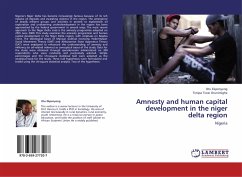Nigeria s Niger Delta has become increasingly famous because of its rich massive oil deposits and escalating violence in the region. The emergence of deadly militant groups and activities in protest to exploitative oil exploration and undeserving underdevelopment in the region has been approached by the federal government in several ways. The most recent approach to the Niger Delta crisis is the amnesty programme adopted on 25th June 2009. This study examines the amnesty programme and human capital development in the Niger Delta region, with emphasis on Bayelsa State. The ideological bases of Marxian political economy, Habermasian Social Movement Theory (SMT) and Althusserian State Apparatus Theory (SAT) were employed to enhanced the understanding of amnesty and militancy (or oil-related violence) as conceptual issues of the study. Data for the study were obtained through questionnaire administered on 300 respondents who were randomly and purposively selected. Simple percentages and the Chi-square statistical tool were adopted as the analytical tools for the study. Three null hypotheses were formulated and tested using the chi-square statistical analysis. Two of the hypotheses
Bitte wählen Sie Ihr Anliegen aus.
Rechnungen
Retourenschein anfordern
Bestellstatus
Storno

